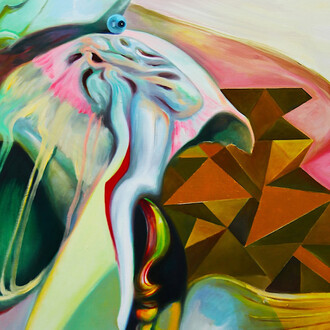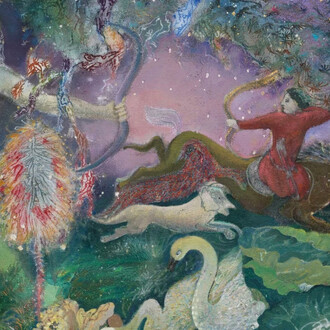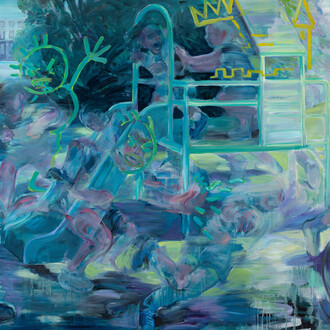HB381 is pleased to announce Manhattan portraits, an exhibition by Karen Bennicke (b. 1943, Denmark). In this new body of work, Bennicke interprets cartographic renderings of the city and its flows of movement, transmuting them into abstract, three-dimensional forms. The artist’s systematic process transforms data points describing urban and architectural space into a complex network of carvings, excavations, and crisscrossing topographies. City streets, urban parks, traffic routes, and subway lines are layered on top of one another, compressed into an afterimage of the forces that created them. Ultimately, Bennicke’s slab-formed sculptures develop a quality of artifacts or fossils. While each work arises from the implementation of a set of rules, the end result is enigmatic and magnetic, charged with arcane symbolism. The earth-toned terracotta and monochrome geometries prompt philosophical rumination on the city as a set of contested relations; her sculptures suggest that, obscured by time, traffic, and constant dynamism, our environment is ultimately unknowable, constantly in a process of formation and sedimentation.
With Manhattan Portraits, Bennicke returns us to a project carried out in the late 1970s by architect Bernard Tschumi titled The Manhattan Transcripts. This book-length series of diagrams, photographs, drawings, and short texts sought to find new ways of thinking about architecture through the use of narratives of motion. Many of these accounts were tinged with the tropes of hardboiled fiction: a chase scene in Central Park culminating in murder, a lethal fall from a high-rise tower, a “border crossing” along Manhattan’s 42nd Street, and a series of unusual actions performed in inner courtyards. In staging these narratives within the vernacular of the built environment, Tschumi suggests that, in one way or another, “all architecture ... is about love and death”.
Bennicke’s Manhattan Portraits reinterprets the same web of streets, piers, and subway lines that fascinated Tschumi. Zeroing in on nine locations in Lower Manhattan, she inserts an emotional tenor and sculptural sensibility unfamiliar to the formalist project of mapping, yet which feels like a natural extension of Tschumi’s earlier Transcripts. The elongated, angular, and precise ceramic sculptures she produced synthesize the three worlds the architect sought to unite: the world of objects, the world of movements, and the world of events.
Bennicke's work is featured in numerous museum public collections, including the Victoria and Albert Museum in London, the Museum of Modern Ceramic Art in Gifu, the Nationalmuseum of Stockholm, and the Designmuseum Danmark in Copenhagen. She is the recipient of the Thorvald Bindesboll Medal from the Royal Danish Academy of Fine Arts and a Lifelong Achievement Award from the Danish Arts Foundation.
















